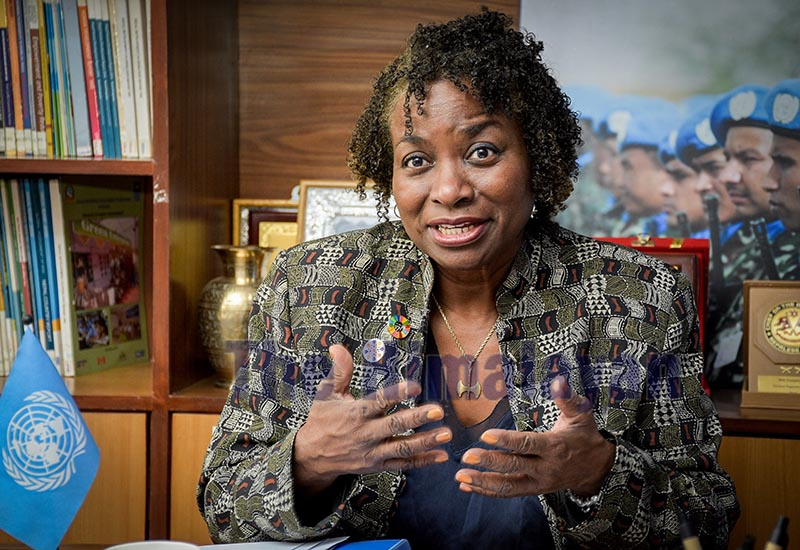UNFPA committed to women empowerment: Dr Natalia Kanem
Kathmandu, October 23
The ‘so-called’ Global Gag Rule, as well as the defunding of United Nations Population Fund by the current US government, impacted the health and well-being of women and girls in many parts of the world, the top United Nations official said.
According to United Nations Under Secretary General and Executive Director of the United Nations Population Fund Dr Natalia Kanem, the GGR and the pushback have led to cutbacks in essential services.
“I am very gratified to say that even though with the GGR, and with the separate defunding of UNFPA, which we greatly regret, as it prevented us from delivering life saving services everywhere in the world including Nepal, what we are seeing is that we are harnessing the power of data and evidence to be able to contradict some of these wrong compressions,” Kanem said, while talking to this daily, in Kathmandu.
According to the visiting UNFPA chief, the GGR and pushback prevented essential information and services from benefiting some of the most vulnerable and marginalised women, girls and youths, mostly in developing countries, where the need was the highest. She also observed that the opposition to basic decency of offering women and girls the right to control over their body and opportunities to be happy and healthy in their community, was being met with the robust defence from women and girls.
“Even as there is growing opposition, there is also growing support for the noble cause of UNFPA. It’s sad that some of these wrong impressions are deliberately misleading, in my opinion, and it is very important to put the truth forward,” she said, adding that the pushback against rights and choices of girls around the world has also led UNFPA to become even more stronger in insisting that it has to lift the curtain on these taboos and discuss these issues.
“That is what the UNFPA will be doing in Nairobi next month,” she said.
“If a woman can’t access contraception, the danger she may have to resort to something like unsafe abortion increases exponentially. If a girl is not able to get information about, not just her body, but her place in society as an equal citizen, she is going to be subject to early marriage, she is not going to be equal in terms of her economic and social prospects.”
In Nepal, UNFPA has elaborated a strategy which is based on: zero maternal deaths, zero unmet need for family planning, and zero gender-based violence and harmful practices, according to Kanem.
A midwife, who goes on her daily rounds, is an example of sexual and reproductive health in action, making childbirth safe in every corner of Nepal, she said, adding, “We also intend to use our ability to engage with the government to clarify some of the issues which can lead to better and stronger alliances to protect women and girls.”
The UN envoy believed that contentious views on issues like abortion, comprehensive sexuality education, LGBTI rights, would be depoliticised one day. “As we focus on ensuring that all people have full access to sexual and reproductive health and rights, we base our work on clear evidence, data, that show, for example, that comprehensive sexuality education does not encourage young persons to be sexually active, but instead imbues with responsibility and the ability to make the right choices at the right time,” she added.
“We should embrace you rather than reject, if you have a different sexual orientation or if you come from a different cast,” she said, reiterating that the UNFPA always stood on the decoration of human rights as well as the sustainable development agenda.
The UN under secretary general also said the Right to Safe Motherhood and Reproductive Health Act-2018, which was endorsed by the Government of Nepal as fundamental human rights, provided a very strong base for expanding access to quality sexual and reproductive health services to those who most needed them.
“It is important to acknowledge the remarkable achievements in Nepal since the International Conference on Population and Development in Cairo 25 years ago, in relation to reduction in poverty, and maternal and neo-natal deaths,” she said, “However, we also recognise that there is a long road ahead before Nepal can claim to have fully realised the ICPD vision, which will also determine the achievement of the Sustainable Development Goals.” The UNFPA chief also expressed her belief on tremendous potential of Nepal.
However, the country needed to accelerate implementation of its development agenda to achieve the growth and prosperity it has been aspiring for. “This includes ensuring empowerment of women and girls,” she said.
READ ALSO:






